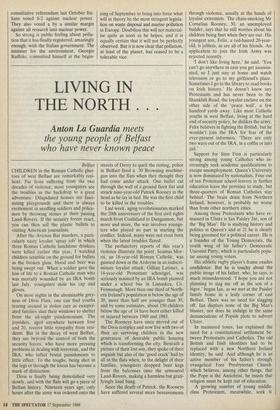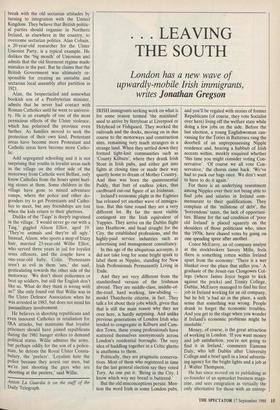LIVING IN THE NORTH . . .
Anton La Guardia meets
the young people of Belfast who have never known peace
Belfast CHILDREN in the Roman Catholic ghet- toes of west Belfast are remarkably resi- lient. Far from suffering from the two decades of violence, most youngsters see the troubles as the backdrop to a great adventure. Dilapidated houses are fasci- nating playgrounds and there is always excitement in needling soldiers and police- men by throwing stones at their passing Land-Rovers. If the security forces react, you can then sell the plastic bullets to visiting American journalists.
After the Avenue Bar murders, a parti- cularly nasty loyalist 'spray job' in which three Roman Catholic lunchtime drinkers were killed earlier this year, I watched children scrabble on the ground for bullets as the broken glass, blood and beer was being swept out. When a soldier gave the kiss of life to a Roman Catholic man who was mortally wounded by an IRA bomb last July, youngsters stole his cap and gloves.
On most nights in the abominable grey- ness of Divis Flats, one can find youths tearing around in stolen cars as exasper- ated families shut their windows to shelter from the ail-night pandemonium. The joyriders, aged anywhere between four and 20, receive little sympathy from resi- dents. But in the decay of west Belfast, they are beyond the control of both the security forces, who have more pressing problems in dealing witlfterrorism, and the IRA, who inflict brutal punishments to little effect. To the toughs, being shot in the legs or through the knees has become a mark of distinction.
Divis is finally being demolished very slowly, and with the flats will go a piece of Belfast history. Nineteen years ago, only hours after the army was ordered onto the streets of Derry to quell the rioting, police in Belfast fired a .30 Browning machine- gun into the flats when they thought they had come under attack. One bullet cut through the wall of a ground floor flat and struck nine-year-old Patrick Rooney in the head as he lay in bed. He was the first child to be killed in the troubles.
Last week, aging revolUtionaries marked the 20th anniversary of the first civil rights march from Coalisland to Dungannon, but more and more, the war involves youngs- ters who played no part in starting the conflict. Indeed, many were not even born when the latest troubles flared.
The perfunctory reports of this year's violence illustrate the point. Seamus Mor- ris, an 18-year-old Roman Catholic, was gunned down in the Ardoyne in an indiscri- minate loyalist attack; Gillian Latimer, a 14-year-old Protestant schoolgirl, was seriously maimed by an IRA bomb planted under a school bus in Lisnaskea, Co. Fermanagh. More than one third of North- ern Ireland's population is below the age of 20, more than half are younger than 30, and by some estimates, about 150 children below the age of 14 have been either killed or injured between 1969 and 1983.
The Rooneys have since moved out of the Divis complex and now live with two of their six surviving children in the new generation of desirable public housing which is transforming the city. Beneath a picture of their lost son, they spoke of their anguish but also of the 'good crack' had by all in the flats when, to the delight of their families, youngsters dropped beer kegs from the balconies onto the armoured Land-Rovers, making a harmless but grati- fyingly loud bang.
Since the death of Patrick, the Rooneys have suffered several more bereavements through violence, usually at the hands of loyalist extremists. The chain-smoking Mr Cornelius Rooney, 50, an unemployed builder, says that he still worries about his children being hurt when they are out. His youngest son, Felix, a red-haired 20-year- old, is jobless, as are all of his friends. An application to join the Irish Army was rejected recently.
`I don't like living here,' he said. 'You can't go anywhere in case you get assassin- ated, so I just stay at home and watch television or go to my girlfriend's place. Sometimes I go to the library to read books on Irish history.' He doesn't know any Protestants and has never been to the Shankhill Road, the loyalist enclave on the other side of the 'peace wall', a few hundred yards away. Like most Catholic youths in west Belfast, living at the hard end of security policy, he dislikes the army. Felix believes in fighting the British, but he wouldn't join the IRA for fear of the ever-present informers. 'There are only two ways out of the IRA, in a coffin or into jail.'
Support for Sinn Fein is particularly strong among young Catholics who in- creasingly seek academic qualifications to escape unemployment. Queen's University is now dominated by nationalists. Four out of ten Protestant school-leavers in further education leave the province to study, but three-quarters of Roman Catholics stay behind. The brain drain from Northern Ireland, however, is probably no worse than from other northern cities.
Among those Protestants who have re- mained in Ulster is Ian Paisley Jnr, son of the 'Big Man'. He is studying history and politics at Queen's and at 21 he is clearly being groomed for a political career. He is a founder of the Young Democrats, the youth wing of his father's Democratic Unionist Party, which is particularly popu- lar among young voters.
His athletic rugby player's frame exudes confidence. But he is touchy about the public image of his father, who, he says, is much misunderstood. 'I hope you are not planning to slag me off as the son of a bigot,' began Ian, as we met at the Paisley family home in a leafy corner of east Belfast. There was no need for slagging off. Ian displays none of the Big Man's bluster, nor does he indulge in the same denunciations of Popish plots to subvert Ulster.
In measured tones, Ian explained the need for a constitutional settlement be- tween Protestants and Catholics. The old British and Irish identities had to be replaced with a new Northern Ireland identity, he said. And although he is an active member of his father's strongly evangelical Free Presbyterian Church. which believes, among other things, that the Pope is the Antichrist, he insists that religion must be kept out of education.
A growing number of young middle• class Protestants, meanwhile, seek tc break with the old sectarian attitudes by turning to integration with the Unitecl Kingdom. They believe that British politic•. al parties should organise in Northern Ireland, as elsewhere in the country, to overcome sectarian politics. Alan Cobain., a 20-year-old researcher for the Ulster Unionist Party, is a typical example. He dislikes the 'big mouth' of Unionism and admits that the old Stormont regime made mistakes in the past. But he claims that the British Government was ultimately re- sponsible for creating an unstable and sectarian local assembly after partition in 1921.
Alan, the bespectacled and somewhat bookish son of a Presbyterian minister, admits that he never had contact with Roman Catholics until he went to universi- ty. He is an example of one of the most pernicious effects of the Ulster violence, which has polarised the province even further. As families moved to seek the protection of their own kind, Protestant areas have become more Protestant and Catholic areas have become more Catho- lic.
Add segregated schooling and it is not surprising that youths in loyalist areas such as the village on the other side of the motorway from Catholic west Belfast, only know Catholics from the hours spent hurl- ing stones at them. Some children in the village have gone to mixed adventure camps, where the police and other do- gooders try to get Protestants and Catho- lics to meet, but any friendships are lost when the kids return to their ghettoes.
Dislike of the `Taigs' is deeply ingrained in the village. 'I would never go out with a Taig,' giggled Alison Elliot, aged 19. `They're animals and they're all ugly.' Instead, Alison, who sports a mop of frizzy hair, married 23-year-old Willie Elliot, who served three years in jail for loyalist arms offences, and the couple have a one-year-old baby, Colin. 'Protestants aren't as evil as them 'uns,' she said, gesticulating towards the other side of the motorway. 'We don't shoot policemen or beat up soldiers, but still the English don't like us. What do they think is wrong with us?' She only found out that Willie was in the Ulster Defence Association when he was arrested in 1983, but does not mind his paramilitary involvement.
He believes in shooting republicans and even innocent Catholics in retaliation for IRA attacks, but maintains that loyalist prisoners should have joined republicans during the 1981 hunger strikes to demand political status. Willie admires the army, but perhaps oddly for the son of a police- man, he detests the Royal Ulster Consta- bulary, the 'peelers'. 'Loyalists hate the police because they arrest our men, but we're just shooting the guys who are shooting at the peelers,' said Willie.
Anton La Guardia is on the staff of the Daily Telegraph.



































































 Previous page
Previous page